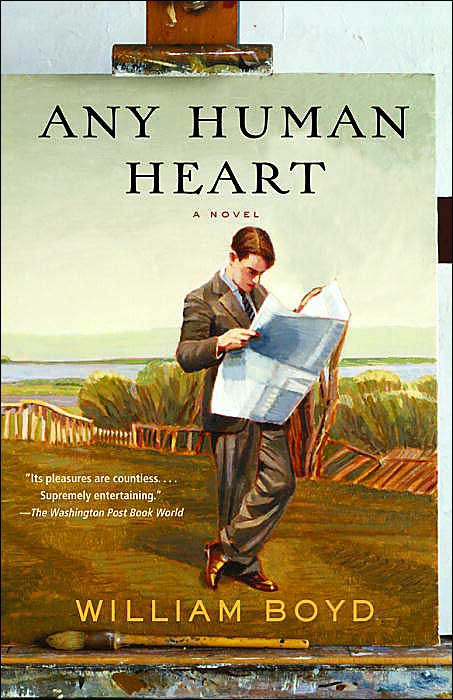
Any Human Heart PDF
Preview Any Human Heart
Logan Gonzago Mountstuart, writer, was born in 1906, and died of a heart attack on October 5, 1991, aged 85. William Boyd's novel Any Human Heart is his disjointed autobiography, a massive tome chronicling "my personal rollercoaster"--or rather, "not so much a rollercoaster", but a yo-yo, "a jerking spinning toy in the hands of a maladroit child." From his early childhood in Montevideo, son of an English corned beef executive and his Uraguayan secretary, through his years at a Norfolk public school and Oxford, Mountstuart traces his haphazard development as a writer. Early and easy success is succeeded by a long half-century of mediocrity, disappointments and setbacks, both personal and professional, leading him to multiple failed marriages, internment, alcoholism and abject poverty.
Mountstuart's sorry tale is also the story of a British way of life in inexorable decline, as his journey takes in the Bloomsbury set, the General Strike, the Spanish Civil War, 1930s Americans in Paris, wartime espionage, New York avant garde art, even the Baader-Meinhof gang--all with a stellar supporting cast. The most sustained and best moment comes mid-book, as Mountstuart gets caught up in one of Britain's murkier wartime secrets, in the company of the here truly despicable Duke and Duchess of Windsor. Elsewhere author William Boyd occasionally misplaces his tongue too obviously in his cheek--the Wall Street Crash is trailed with truly crashing inelegance--but overall Any Human Heart is a witty, inventive and ultimately moving novel. Boyd succeeds in conjuring not only a compelling 20th century but also, in the hapless Logan Mountstuart, an anti-hero who achieves something approaching passive greatness. --Alan Stewart, Amazon.co.uk
From Publishers WeeklySurely one of the most beguiling books of this season, this rich, sophisticated, often hilarious and disarming novel is the autobiography of a typical Englishman as told through his lifelong journal. Born to British parents in Uruguay in 1906, Logan Mountstuart attends an English prep school where he makes two friends who will be his touchstones for the next eight decades. The early entries in his journal, which record his sexual explorations and his budding ambitions, provide a clear picture of the snobbery and genteel brutality of the British social system. Logan is a decent chap, filled with a moral idealism that he will never lose, although his burning sense of justice will prove inconvenient in later years. He goes down from Oxford with a shameful Third, finds early success as a novelist, marries a rich woman he doesn't love, escapes to Spain to fight in the civil war and is about to embark on a happy existence with his second wife when WWII disrupts his and his generation's equilibrium. He's sent on a na‹ve spying mission by British Naval Intelligence and imprisoned for two years. On his release, he finds that tragedy has struck his family. Logan's creativity is stunted, and he slides into alcoholism, chronic infidelity and loneliness. "I believe my generation was cursed by the war," Logan says, and this becomes the burden of the narrative. He resorts to journalism to earn a living, specializing in pieces about the emerging stars of the art world, whom he encounters-somewhat like Zelig-in social situations. Logan's picaresque journey through the 20th century never seems forced, however. His meetings with Picasso, the Duke and Duchess of Windsor, Hemingway and Ian Fleming are adroitly and credibly interposed into the junctures of his life. This flawed yet immensely appealing protagonist is one of Boyd's most distinctive creations, and his voice-articulate, introspective, urbane, stoically philosophical in the face of countless disappointments-engages the reader's empathy. Logan is a man who sees his bright future dissipate and his great love destroyed, and yet can look back with "a strange sense of pride" that he's "managed to live in every decade of this long benighted century." His unfulfilled life, with his valiant efforts to be morally responsible, to create and, finally, just to get by, is a universal story, told by a master of narrative. Boyd, back in top form, has crafted a novel at least as beautifully nuanced as A Good Man in Africa and Brazzaville Beach. Logan's journal entries are so candid and immediate it's difficult to believe he isn't real. And after 496 pages, it's hard to say good-bye.
Copyright 2002 Reed Business Information, Inc.
